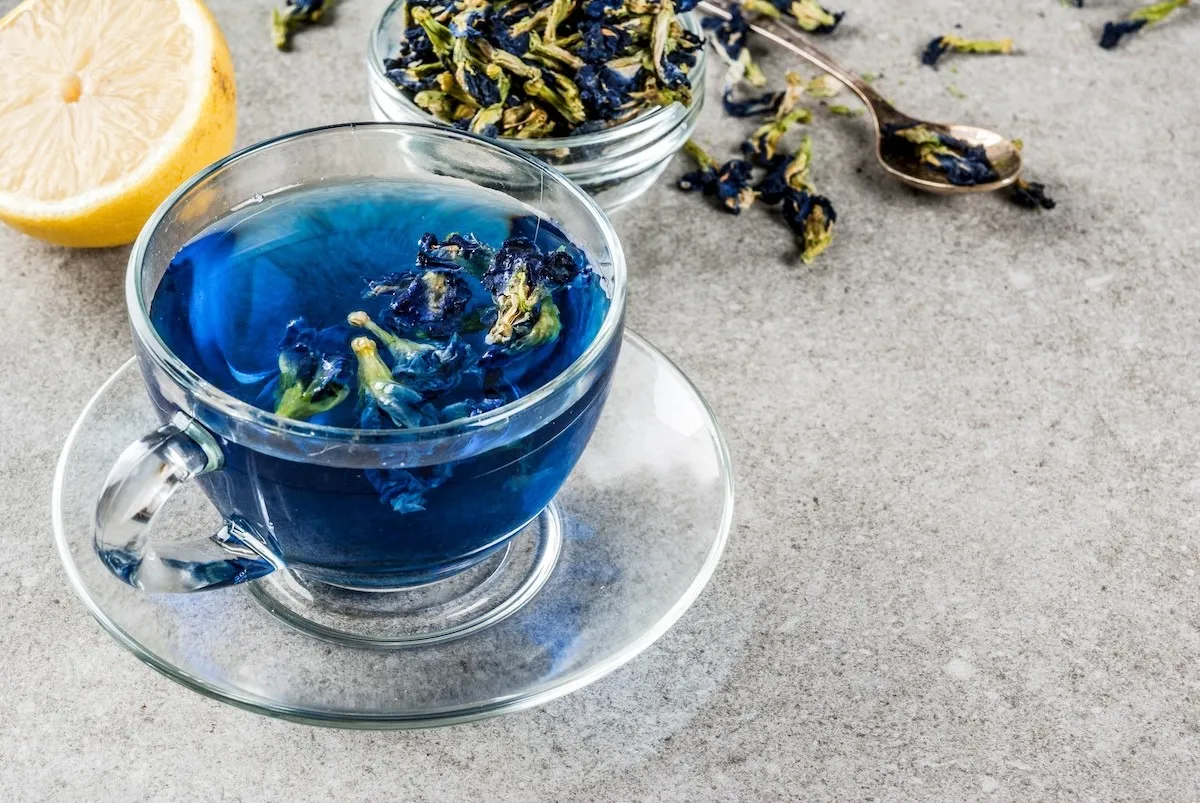Butterfly Pea Flower: What Is It and How Can This Tea Improve Your Health?

By now, you’ve surely heard that green tea comes with a whole host of health benefits—but what about “blue tea,” the richly-hued herbal beverage that’s been taking TikTok by storm? Also known as butterfly pea flower tea, this caffeine-free herbal drink is made from the petals of the Clitoria ternatea plant, explains Raj Dasgupta, MD, chief medical advisor for Garage Gym Reviews.
“It’s famous for its vibrant blue color, which changes to purple when you add lemon juice. The tea has a mild, earthy flavor and is packed with antioxidants,” the physician tells Best Life.
RELATED: This “Powerhouse” Vegetable Is the Healthiest, CDC Says—But You’re Probably Not Eating It.
Butterfly Pea Flower Benefits

Dasgupta says that butterfly pea flower tea has traditionally been used throughout Southeast Asia for its wellness benefits, many of which can be traced back to its high concentrations of antioxidants.
“It’s thought to help combat oxidative stress thanks to anthocyanins”—a class of flavonoids that give various fruits, vegetables, and flowers their color—”promote relaxation, and might even support memory and cognitive health,” Dasgupta says.
In addition, he notes that the tea may benefit hair and skin thanks to its antioxidants and bioflavonoids, which “support collagen production and strengthen hair.”
Chris Mohr, PhD, RD, fitness and nutrition advisor at BarBend, adds that the tea may also help lower blood sugar and stabilize insulin levels. It’s known to help reduce inflammation and, by association, a range of inflammatory chronic health conditions.
A 2022 study published in the journal Scientific Reports explored the possible health benefits of anthocyanin-rich portions of the Clitoria ternatea, measuring its ability to fight free radicals (antioxidant activity), kill bacteria (antibacterial activity), and affect cells (cytotoxicity).
Researchers determined that the isolated anthocyanins showed strong antioxidant effects, meaning they could help protect cells from damage. They also contained strong anti-bacterial properties that were effective against E. coli and Bacillus species of bacteria.
RELATED: This Food Can Trigger a 15% BMI Weight Loss—But You’re Probably Not Eating It.
Butterfly Pea Flower Risks

However, researchers also found that the concentrated anthocyanin-rich fractions of the plant were more toxic to human kidney cells when compared with whole flower extracts. While some health experts may recognize the benefits of butterfly pea flower tea, they may also advise caution for this reason—especially as researchers learn more about the increasingly popular plant.
Dasgupta adds that while butterfly pea flower tea is generally considered safe, a few things should be kept in mind before incorporating it into your routine.
“Pregnant or breastfeeding individuals, or those taking medications like blood thinners or diabetes treatments, should check with a doctor before trying it since it may affect blood sugar or interact with medications,” he says. “People allergic to plants in the pea family should steer clear. It’s not a miracle cure, but it can be a nice addition to a balanced diet if enjoyed in moderation. Drinking too much might upset your stomach, so starting small is a good idea.”
The Takeaway
Still, Mohr says that blue tea may further enhance the well-being of people in good health.
“I would suggest butterfly pea flower tea as something to consider to patients looking to increase their antioxidant intake and overall health naturally,” he notes. “It’s important, though, to tailor any supplement to your own health needs. No single tea, supplement, or food, including butterfly pea powder, is a magic bullet.”